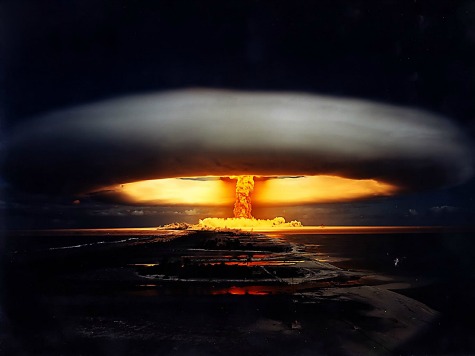
Britain must retain its status as a nuclear power to avoid risks posed by Russia, a powerful committee of Members of Parliament has said. The cross-party group has argued that without an investment in a new generation of at-sea nuclear weapons to replace the ageing Trident system, the UK would be vulnerable to bullying from Moscow.
According to the Times the ‘Trident Commission’, established to look at the options, believes that threats from biological weapons are also a danger. The commission, co-chaired by Sir Malcolm Rifkind for the Conservatives, Lord Browne of Ladyton for Labour, and Sir Menzies Campbell for the Liberal Democrats, rejected any suggestion of an alternative to ballistic missile submarines as a credible deterrent.
The commission was put together by the British American Security Information Council (BASIC), and published its report on Britain’s nuclear weapons policy today.
At present Britain’s nuclear deterrent is delivered through an operational system of four Royal Navy Vanguard-class submarines each armed with eight Trident II D-5 ballistic missiles. It is able to launch from various locations around the world, even if the United Kingdom itself is under attack.
It is controversial as it is by the far the most expensive outlay for the British military, and the Liberal Democrats had suggested ending the continuous at-sea deterrence. This would reduce the number of submarines and missiles required.
The decision on Trident’s future is expected in 2016, after the next general election. The Conservatives and Labour are likely to run on a platform of a full ‘like for like’ replacement of the system. This would cost around £20bn.
Whilst the report accepted submarines were vital it did raise the possibility of reducing their number. This could be done by talking to Washington, D.C. and Paris to discuss how to co-ordinate how NATO allies are protected. Analysis by BASIC calculated Britain could save between £500 million and £1 billion over the next decade by reducing its patrols by half through co-ordination with the United States and France.
The report said: “We believe that the crucial consideration for the British government in deciding upon the renewal of its nuclear deterrent is national security.
“If there is more than a negligible chance that the possession of nuclear weapons might play a decisive role in the defence of the UK and its allies in preventing nuclear blackmail or in affecting the wider security context within which the UK sits, then they should be retained.”
Trident’s stated aim is “the minimum effective nuclear deterrent as the ultimate means to deter the most extreme threat”, and the report agreed supported the idea of a minimum deterrence. It said a review of defence to take place next year should consider reducing the stockpile of nuclear missiles. The arsenal is already in the process of being reduced to 120 from 160 missiles. This would help reduce the £2.9 billion a year running costs.
The report’s findings will be greeted as good news by Prime Minister David Cameron and his Conservative colleagues. They are determined to replace Trident but face stiff opposition from the Liberal Democrats in the coalition government. Before Russia began flexing its muscles in Crimea many Liberal Democrats secretly wanted to scrap the nuclear weapons programme altogether, but now any such a policy seems unlikely.
The government is also keen to promote energy security through things like fracking, which will ensure the UK is not reliant on Russian gas. This in turn will do serious economic harm to Russia, which despite its leaders’ bravado, has a far smaller GDP than Britain and would struggle without energy exports to Europe.

COMMENTS
Please let us know if you're having issues with commenting.